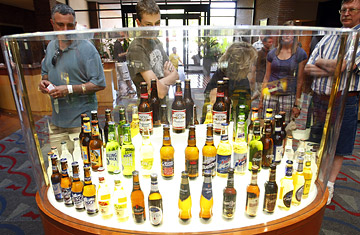
Belgian-Brazilian brewer InBev has purchased St. Louis–based Anheuser-Busch in a $52 billion takeover, creating the world's largest brewer. Here visitors to the Anheuser-Busch Tour Center check out a display showing all of the brands made by the company.
As the foam settled on the biggest drinks merger in history, workers at Anheuser-Busch have been a lot less keen than shareholders to toast the company's $52 billion takeover by the Belgium-based behemoth InBev. Unions in hard-hit St. Louis, Missouri, where Budweiser has been brewed since 1876, pledged to protect the jobs of Anheuser-Busch's's 30,000-strong workforce. They better roll up their sleeves, because InBev will bring to town a reputation as a ruthless cost-cutter that has prospered by slicing fat from its units, consolidating breweries and laying off staff in a relentless drive for efficiency.
"This is a management-driven company, not brand-driven," says Theo Vervloet, the chairman of trade association Belgian Brewers. "They will use salami tactics: slicing here and there in little bits. InBev has to pay off some $7 billion in debt, and it will look for savings everywhere. The Anheuser-Busch family has been brewing for 150 years, but they will have to answer to new bosses now."
InBev itself was only created in 2004, from the merger of Belgium's Interbrew with Brazil's AmBev. It is headquartered in the Flemish city of Leuven, where the company can trace its brewing roots back to 1366. Though the board includes former Belgian Prime Minister Jean-Luc Dehaene, the firm's power brokers are Brazilian investment bankers who have placed an accounting technique known as zero-based budgeting at the heart of their global strategy. It compels divisions to justify all costs for each year, rather than simply adjusting the baseline spending from the previous year.
InBev's empire sprawls across 200 brands including Beck's, Stella Artois, Labatt, Brahma, Leffe, Hoegaarden and Skol. The combined company will now be called Anheuser-Busch InBev, and headed by InBev's Brazilian chief executive, Carlos Brito. InBev has pledged that the company's North American headquarters would remain in St. Louis, and that none of Anheuser's 12 U.S. breweries would be closed. The two brewers say their merger will generate annual savings of $1.5 billion from measures like better managing the supply chain and that layoffs will be kept to a minimum because there is little current overlap between the two businesses.
Yet in a bid to fend off the unsolicited merger, Anheuser-Busch management last month itself unveiled its own "Blue Ocean" cost-cutting program, promising savings of $1.09 billion by 2011 but losing around 1,200 jobs in the process. And with global recession threatening, beer markets consolidating, barley and aluminum prices soaring, and sales declining in many mature markets, there are fears of further cuts. Tellingly, Brito made no promises on job cuts, nor on the sale of non-core assets like Anheuser-Busch's theme parks and its aluminium can recycling units.
Belgian unions warn their comrades in St. Louis to expect the worst. "I wouldn't trust their promises," says Alfons De Mey, president of the 110,000-member Belgian food and hotel workers union. "InBev is all about money. We've seen centuries-old breweries close down here in Belgium, and there are now only two big ones left in the country, in Leuven and Jupille." He says beer-making has changed beyond recognition in recent years. "Before it was run by brewers, but now it's bankers."
Similar tales emerge from Brazil, where brewery workers have seen their numbers fall from 23,000 in the 1990s to 13,000. And in Canada, where InBev owns Labatt, there were plant closures, layoffs, changes in work rules, years of strikes, and alleged intimidation of union members by outside security forces.
One expected casualty in the merger might be marketing: Anheuser-Busch spent an estimated $378 million on advertising in the U.S. last year. Bud's campaigns involving the Whassup Guys, the Clydesdales, NASCAR and the Superbowl have become iconic mainstays of American advertising.
Carlos Brito has insisted there are no plans to trim advertising, and says that Anheuser-Busch's marketing expertise is one reason it has developed into such a powerful brand. InBev's CEO says savings will instead come from using the combined company's size to secure lower prices for ingredients and packaging materials, eliminating some market overlap and cutting redundant corporate expenses.
Such measures may not be enough to satisfy InBev's cost-cutting demands. What's clear is that Budweiser, "The King of Beers," will have to defer to new masters who have so far manifested little deference to any royal reputation.
